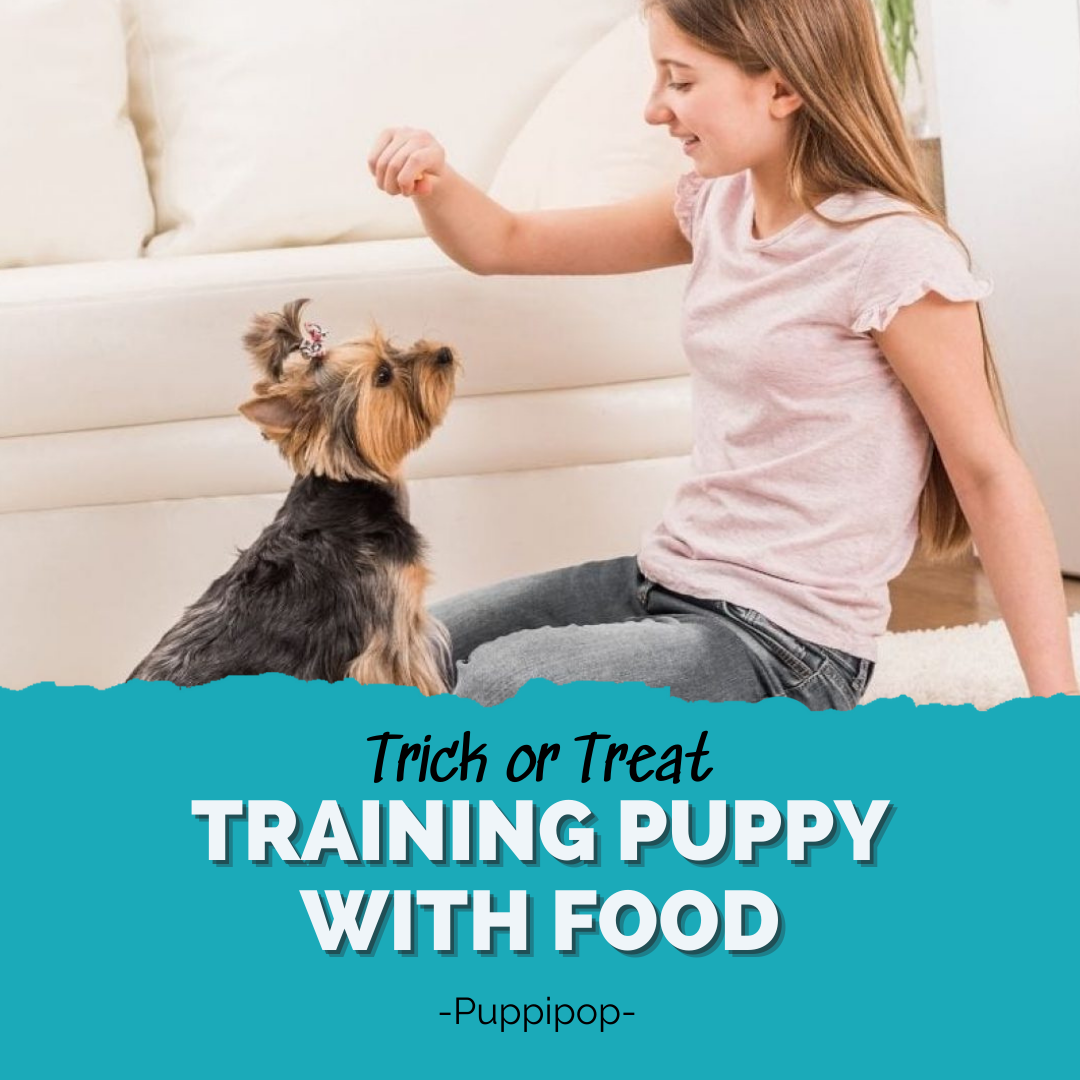Training your little puppy is a long and exciting adventure. It is very important and can bring joy and pleasure to you and your four-legged friend. Training your puppy is a challenging task but not necessarily a hard thing to do.
Reinforcing your puppy with treats to teach tricks will not only help him learn but also love the process.
Why use treats for puppy training?

Offering them treats during training sessions is rewarding for you and your puppy. Dog treats are a powerful tool for training. You may need to use the best dog treats and change them every now and then to keep your fur buddy engaged.
- Puppies learn and perform better with positive reinforcement techniques that include food treats. Instead of punishing your dog, you need to offer them treats to reinforce good behaviors.
- It builds a positive association with the behavior and your puppy will likely repeat that behavior. This makes training much easier.
- Treats are easy to use. When teaching your puppy a new trick, there is a high number of repetitions in a short amount of time. You can offer treats very quickly when they learn the new trick.
Dog treats carry a varied motivational value to your puppy. Complex tasks need high-value treats while simple and repetitive things can be managed with low-value treats. Check your puppy's reaction while giving a treat.
How to use treats for puppy training

As a responsible puppy parent, you must understand how to train your puppy effectively. Treats are known to be most effective in the early stages of a puppy's training. Earning compliance from your puppy during training will be possible if you reinforce them positively with food treats.
Here are some tips for training your puppy with food:
- Don't bribe your puppy
The most important thing to bear in mind is you must only use treats as a reinforcement tool. They mustn’t be used as bribes. Don't train your puppy in such a way that it only follows your commands when bribed with food treats. Always keep the treats hidden and only show them after your puppy has successfully learned a behavior.
- Reward each step towards the desired behavior
You should reward your puppy's progress towards the ultimate goal during the training sessions, no matter how small the progress is. The behavior that is rewarded timely gets repeated. If rewards and good things tend to follow a behavior, a puppy will do more of it. If you want to make sense to your puppy, you must respond to your puppy's behavior timely.
- Remove distractions from your puppy's environment
Puppies usually get distracted and excited by any noise or movement. Also, avoid all kinds of distractions during training sessions.
- Don't train on a full tummy
After meals, your puppy is less likely to work for the food treats. Training sessions would be best just before mealtime when your puppy is getting munchy. That's the time when the food treats will help your puppy pick things up straight away.
- Offer dog treats in moderation
- Treat size is important
Look for a treat that is small or is easy to break into small pieces so that they are quickly consumed by your puppy. By using small treats, your puppy can get more treats in a session without causing an upset stomach. For repetitive tasks, you can even use pieces of treats.
- Tasty for your dog
If your puppy doesn’t like the taste of the treat, it will not feel motivated. Treats should be tasty for your puppy. Don't be afraid of experimenting with treats. Try different treats till you find the ones your puppy gets truly excited about.
- Phase-out the treats
Treats should be used appropriately. Once your puppy has learned a new behavior, you can reduce the frequency of giving treats. Begin offering treats to your puppy occasionally, once in a while. Otherwise, you might easily fall into the bribery trap.
- Variety is the spice of life
Find a few favorites for your puppy and switch up their treats regularly. Puppies can get bored with the same treat trick every time. Rotating between several favorite treats will keep your puppies interested and help keep them motivated.
- Choose healthy treats
While table scraps or other human foods might sound good, it is better to go for a treat specifically created for puppies. Look for ingredients you recognize like chicken, ground rice, corn, flour, etc. Avoid artificial colors, flavors and preservatives.
- A mix of high and low value
Treats and rewards can be given for any behaviors that are desirable. You can make your puppy listen to you by offering a high rate of reinforcement. Your dog might not be listening to you due to the low rate of reinforcement. Your dog can become motivated by delicious food treats like kibble, fruits, vegetables, biscuits.
- Accompanying treats with praise and petting
Puppies thrive on love and affection. Praise, petting, and kind words combined with a delicious treat becomes a powerful tool for puppy training.
For training purposes, the treats should be small, soft, easily swallowed, and need very little chewing. With such treats, you can reward your puppy quickly, often, and with little.
Food treats that should be avoided during training

Choosing the best treats for your puppy during training is not always easy. Be sure to offer your puppy delicious treats for a job well done so it continues to be engaged and motivated.
Treats that are not safe for your puppies during training include:
- Macadamia nuts and walnuts
- Chocolate
- Candies and desserts that contain artificial sweeteners like Xylitol
- Cooked bones that are likely to splinter
- Onion and garlic
- Grapes and raisins
- Avocados
Pro tip: If your puppy eats something that is toxic for him, speak to your vet as soon as possible.
5 amazing tips for puppy training

Here are some amazing tips to help train your puppy:
- Begin training your puppy as early as possible
Puppies need socialization and training right from the start. The little furry creatures respond well to early training. Try to start training your puppy when it is just 7-8 weeks old. It will be much easier to teach your puppy when it is still young.
- Avoid distractions during training
Puppies become easily distracted and become excited by any noise or activity. Try to avoid all kinds of distractions while you begin training your fur buddy.
Start training your puppy in an area with minimum distractions. Once your puppy becomes comfortable, you can gradually move on to more distracting areas.
- Keep it short and sweet
Just like with any small kid, a puppy’s attention span is quite short. Puppies are generally excited and want to explore everything! They tend to lose focus very quickly. Try to keep your puppy's training sessions short and sweet.
Usually, short bursts of training are far more suitable for puppies. In long training sessions, your puppy will get bored and lose interest. Always end the puppy training session on a positive note.
- Reward-based training
Puppies learn best with positive reinforcement or reward-based training. Punishments and yelling will damage their personality and make them stubborn. Instead of punishing your puppy, you need to positively reinforce good behaviors.
You can use delicious treats, toys, or playtime as rewards for your puppies on completing the tasks successfully.
- Show patience and stay consistent
Training takes time and commitment, so don’t lose your patience. As long as you praise your puppy and offer treats, they will eventually learn. You will have to reshape your puppy’s behavior with encouragement and reward.
Final thoughts

Training your puppy is a commitment and requires time, patience, and dedication. Be consistent with your puppy and show a lot of patience during training. Puppies learn at different rates so don't worry if your little guy doesn't pick things up straight away. Some puppies might need a lot of repetition to absorb the lessons. Treats are great tools for the beginning stages of puppy training but you shouldn’t be relying on them for too long.
If you are unable to devote much time to your puppy, you can get help from a professional dog trainer.
Puppies are truly charming, loving, and amazing pets. As a responsible puppy owner, you must understand how to train your furbaby effectively. Remember, you need to be consistently firm and patient with your puppy but never harsh.
Train your fur baby properly and he will grow up into a well-behaved dog!



